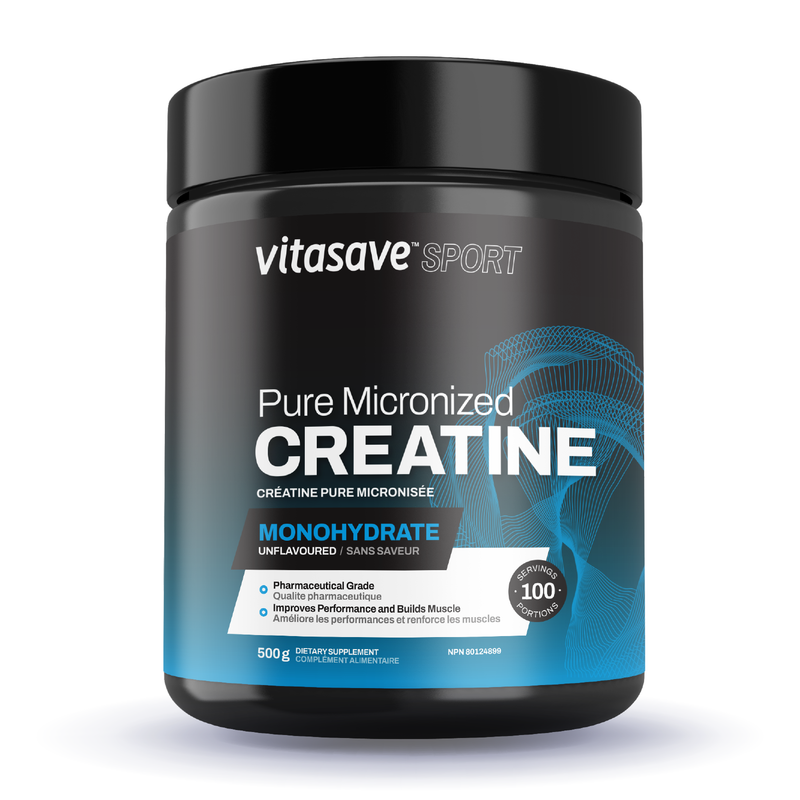In the world of sports nutrition, few supplements have gained as much popularity and acclaim as creatine. Its ability to enhance athletic performance and muscle growth has made it a staple for athletes and fitness enthusiasts alike. However, one question that often arises is when is the best time to take creatine - before or after a workout? In this article, we will explore this ongoing debate and introduce you to a high-quality creatine supplement, Vitasave Sport Pure Micronized Creatine.
What is Creatine?
Before delving into the timing debate, let's understand what creatine is and why it's considered a valuable supplement for athletes and fitness enthusiasts.
Creatine is a naturally occurring compound found in small amounts in various foods and synthesized by the body. It plays a crucial role in the production of adenosine triphosphate (ATP), which is the primary energy currency of our cells. During short bursts of intense physical activity, such as weightlifting or sprinting, the body relies heavily on ATP for energy. This is where creatine comes into play.
Supplementing with creatine increases the body's creatine phosphate stores, allowing for a more rapid regeneration of ATP during high-intensity efforts. In simple terms, it provides your muscles with the energy they need to perform at their best, ultimately leading to improved strength, power, and endurance.

The Debate: Pre-Workout vs. Post-Workout Creatine Intake
The question of when to take creatine - before or after a workout - has sparked a considerable amount of debate among athletes, trainers, and researchers. Both approaches have their merits, and the right choice may depend on various factors, including individual goals and preferences.
Pre-Workout Creatine Intake
Taking creatine before a workout has gained popularity for several reasons:
1. Enhanced Performance: Many studies suggest that consuming creatine before exercise can lead to an immediate increase in muscle creatine levels. This boost in creatine availability may enhance performance during high-intensity, short-duration activities.
2. Increased Power Output: Athletes often report experiencing increased power and explosiveness when supplementing with creatine before a workout. This can be especially beneficial for activities like weightlifting, sprinting, and jumping.
3. Muscle Cell Hydration: Creatine has a water-attracting property, which can lead to increased muscle cell hydration. This may contribute to cell volumization, making your muscles look fuller and potentially aiding in muscle growth.
4. Faster Recovery: Some individuals find that taking creatine pre-workout helps reduce muscle soreness and speeds up recovery between workouts.
Post-Workout Creatine Intake
On the other hand, proponents of post-workout creatine intake argue the following advantages:
1. Improved Recovery: After a strenuous workout, your muscles are in a state of increased receptivity. Taking creatine post-workout can capitalize on this receptive state, allowing for better absorption and utilization.
2. Muscle Repair: Creatine may support muscle repair and growth by facilitating the replenishment of energy stores depleted during exercise.
3. Reduced Stomach Discomfort: Some individuals experience stomach discomfort when taking creatine on an empty stomach. Post-workout supplementation may help avoid this issue.
4. Muscle Growth : Post-workout creatine intake, in particular, has been shown to increase lean muscle mass and strength due to its ability to support muscle repair and replenish energy stores after an intense training session.
Overall, there doesn't seem to be a massive difference between consuming creatine before or after exercise in terms of gaining muscle strength and growth. However, research suggests that the most noticeable benefits are observed when creatine is consumed in proximity to the workout, either before or after, as opposed to taking it farther away from a workout.

Individual Factors
It's important to note that the ideal timing of creatine intake may also vary from person to person. Individual factors, including your workout goals, body type, and personal preferences, play a role in determining when to take creatine.
If your primary goal is to maximize your performance during a workout, you may lean towards pre-workout supplementation. Conversely, if you're more focused on recovery and muscle repair, post-workout intake might be preferable.
Experimentation and consistency are key. Some individuals may find that a combination of both pre- and post-workout creatine intake works best for them, providing the benefits of improved performance and enhanced recovery.
Introducing Vitasave Sport Pure Micronized Creatine
Regardless of when you choose to take creatine, the quality of the supplement matters significantly. This is where Vitasave Sport Pure Micronized Creatine comes into play. Vitasave is renowned for its commitment to purity, quality, and effectiveness.
Pure and Micronized: Vitasave Sport Pure Micronized Creatine is made from 100% pure creatine monohydrate. It is micronized to enhance solubility and absorption, ensuring you get the most out of each serving.
Quality Testing: Vitasave ensures premium quality with lab-tested Micronized Creatine Monohydrate, meeting the highest standards for purity and potency, giving you confidence in your supplement choice.
Versatility: Vitasave Sport Pure Micronized Creatine is versatile and can be taken before or after your workout, depending on your preference and routine.

In the pre-workout vs. post-workout creatine timing debate, there is no one-size-fits-all answer. The right choice depends on your individual goals, preferences, and how your body responds. What's most important is that you're consistent in your supplementation and choose a high-quality product that works.
By incorporating creatine into your fitness routine and paying attention to your body's responses, you can harness the benefits of improved performance, enhanced recovery, and potential muscle growth. Whether you take it before or after your workout, creatine has the potential to elevate your athletic performance and help you achieve your fitness goals.

